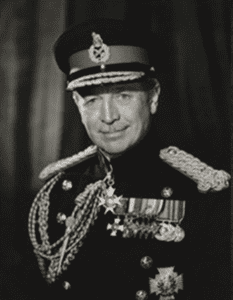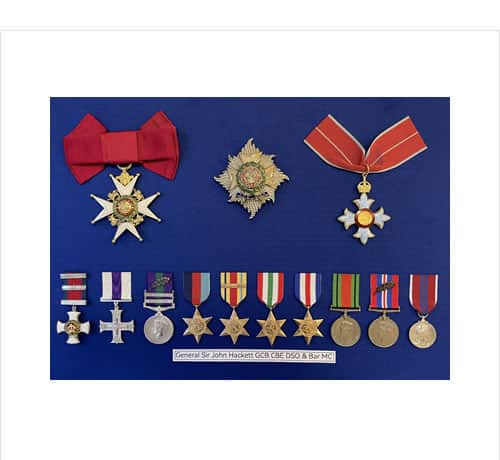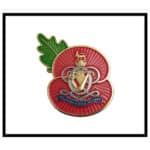General Sir John Hackett, Colonel of The Queen’s Royal Irish Hussars from 1969 to 1975, died aged 86 at his home, Coberley Mill, on 9 September 1997.

He was the greatest soldier-scholar of his generation, of worldwide fame for an infinite variety of faculties and accomplishments, and at the same time a man who found deep satisfaction in the simpler pleasures of life his dear family and friends, country pursuits, agreeable company, music, literature, intelligent conversation, good wine.
It is not given to many men to distinguish themselves in so many fields, but Shan Hackett seemed to do so almost effortlessly.
A gallant, highly decorated commander in the field at many levels; an academic of prodigious powers; a master of numerous languages; with a profound love for and knowledge of history and literature; himself a formidable writer and lecturer, all these combined with a deep appreciation of music and painting, together with equestrian and angling skills; and above all the gift of humanity, kindness and understanding went hand in hand with absolute integrity in regard to the things and people he believed in.
All in all, he stood peerless among his contemporaries and seemed to provide an answer to Charles Churchill’s rhetorical question: ‘By different methods different men excel, But where is he who can do all things well?’ This is not to say that Shan Hackett could not be sharp with those he thought guilty of pretension, whether social or intellectual.
There were also times when he displayed his remarkable cleverness to the discomfort of others. But those of us fortunate enough to be among his comrades and friends will recall rather his twinkling eye, his infectious chuckle, his wit and his evident joy in being with those he valued.
John Winthrop Hackett was born on 5 November 1910, the son of an Australian judge, Sir John Hackett, and was educated at Geelong Grammar School and New College, Oxford, where he read Greats.
In 1931 he was commissioned into the Regiment in which his great-grandfather had served, the 8th King’s Royal Irish Hussars.
During the early years of his service, while attached to the Italian cavalry, he added an interpretership in Italian to similar qualifications he already had in French and German.
Later while serving with the Transjordan Frontier Force – an appointment he relished for its abundance of equitation, adventure and life with Arabs he learned Arabic too, and for his B.Litt wrote a thesis on Saladin’s campaigns against the Third Crusade.
It was during the second world war that Shan Hackett showed what a fine and courageous leader he was. First, while still with the TJFF he fought in the Syrian campaign of 1941, was wounded and awarded the Military Cross, and during his convalescence, met and in 1942 married Margaret Frena who was Austrian.
Next, he served with his Regiment, the 8th Hussars, in the Western Desert in 1942, both commanding a squadron and also acting as 2IC of the temporarily amalgamated 4th/8th Hussars. He was again wounded and awarded the DSO.
While recovering, Lt Col Hackett, serving, rarely for him, on the staff, made an enormously important contribution to future operations by helping to organise three unconventional raiding forces the Long Range Desert Group, the Special Air Service under David Stirling, and Popski’s Private Army.
He was then appointed to raise the 4th Parachute Brigade, and it was while commanding it that he took part in the most dangerous and daring operation of his career.
After some activities in the Italian campaign, the 4th Parachute Brigade returned to England, and in September 1944 as part of the British 1st Airborne Division landed near Arnhem to seize the bridge there. Shan Hackett was badly wounded during the battle and taken prisoner, but after escaping was harboured by a brave Dutch family, who nursed him back to health until at length he succeeded in returning to British lines.
In his eloquent and moving account of it all, I Was a Stranger, he showed how beautifully and with what humility he could write. He was awarded a bar to the DSO for his gallantry and leadership at Arnhem. He had a deep affection for the 4th Parachute Brigade, deplored the bad planning which had led to its heavy losses, and each year would preside at a dinner held for his former comrades in the Brigade.
After the war, Shan Hackett held a number of command appointments – 20th Armoured Brigade and 7th Armoured Division – where he set an example by encouraging others to improve their fluency in German, so that like himself, soldiers of BAOR could communicate more readily with their hosts.
He then commanded the Military College of Science from 1958 to 1961, showing himself to be more than a match intellectually for the academic staff there, and after a short time as GOC Northern Ireland, when he wrote and delivered his quite brilliant Lees Knowles lecture at Cambridge, called The Profession of Arms (subsequently expanded, illustrated and published as a handsome hardback), he was in 1963 made Deputy Chief of the General Staff, overseeing the reorganisation of the Territorial Army, an exercise which proved highly controversial.
Then finally in 1966, he was given the command for which he was so eminently qualified and which he carried out with great success and distinction – Colonel-in-Chief Rhine Army and Commander Northern Army Group. Still, no stranger to controversy, while holding this appointment, he published a letter in The Times, highly critical of the British Government’s apparent indifference to the inadequacies of NATO’s strength, a matter which brought him into a civilised disagreement with the then Defence Minister, Mr (now Lord) Healey.
For the country in general and for King’s College, London, in particular, it was probably as well that Sir John Hackett did not become Chief of Defence Staff. Quite apart from the temptation that he would have been unable to resist for demonstrating to politicians and military men alike how much cleverer he was than they, he was not only to become a champion of undergraduates but able to devote more time to writing and lecturing while showing his fellow academics how to be more approachable and how properly to foster public relations.
As The Times obituary put it:
‘No man could have made the transition from khaki to gown more elegantly, or with greater enjoyment.’
His activities continued as widely as ever. Two books on global strategy were acclaimed: The Third World War published in 1978 was a best seller, advising the west how to ensure that there would not be one, and was followed a few years later by The Third World War: The Untold Story. Apart from all his academic work and ceaseless literary and journalistic output, Sir John Hackett was constantly in demand for television programmes and radio commentary.
His list of honours dwarfs that of most men.
He never lost touch with his military life, and as Colonel, The Queen’s Royal Irish Hussars from 1969 to 1975 he was constantly vigilant in both ensuring a steady inflow of excellent officers and visiting the Regiment no matter where they were stationed.
These visits were greatly appreciated and enjoyed by all ranks.
Leaving aside all these honours and achievements, no one could fully understand Shan Hackett without seeing him with his beloved wife, Margaret, and their daughters – their own, alas, who predeceased him, and his two adopted stepdaughters.
The warmth and sincerity of their friendship and love were there to be admired and emulated. Nor should Shan’s and Margaret’s devotion to country life be overlooked. To see them after a day’s salmon fishing or with a new-born lamb at their lovely Gloucestershire mill was to discover another, simple, kindly and gentle side to this remarkable human being.
We offer our deepest sympathy to Margaret and her family, and while we mourn the loss, we honour the memory of General Sir John Hackett, a great and good man, blessed not only with exceptional talent but with both humour and humanity, who personified Wordsworth’s ideal soldier:
This is the happy Warrior; this is He That every Man at Arms should wish to be.



